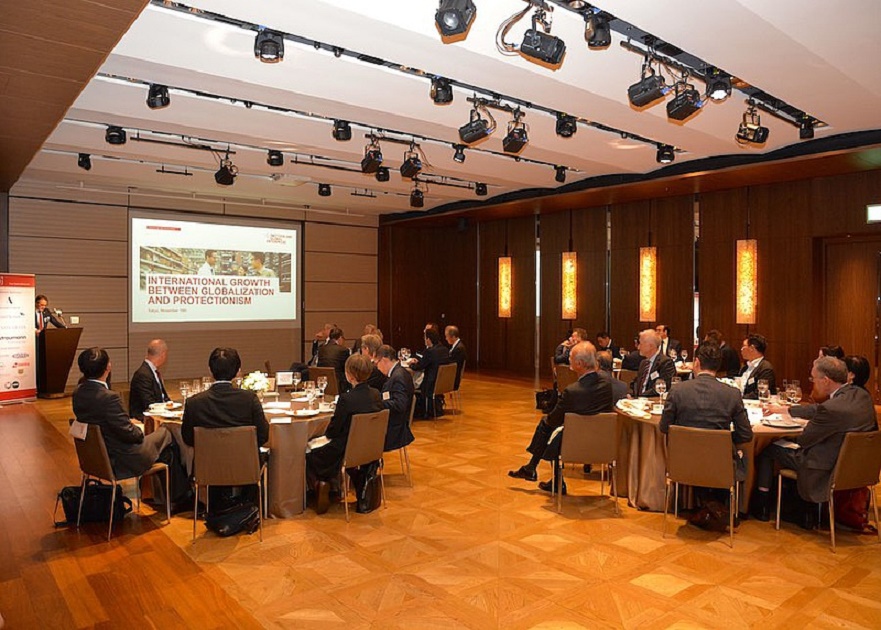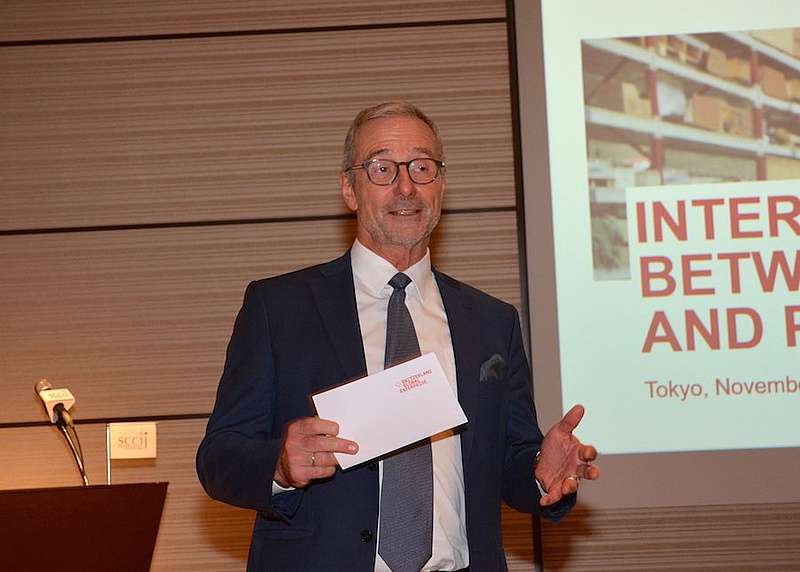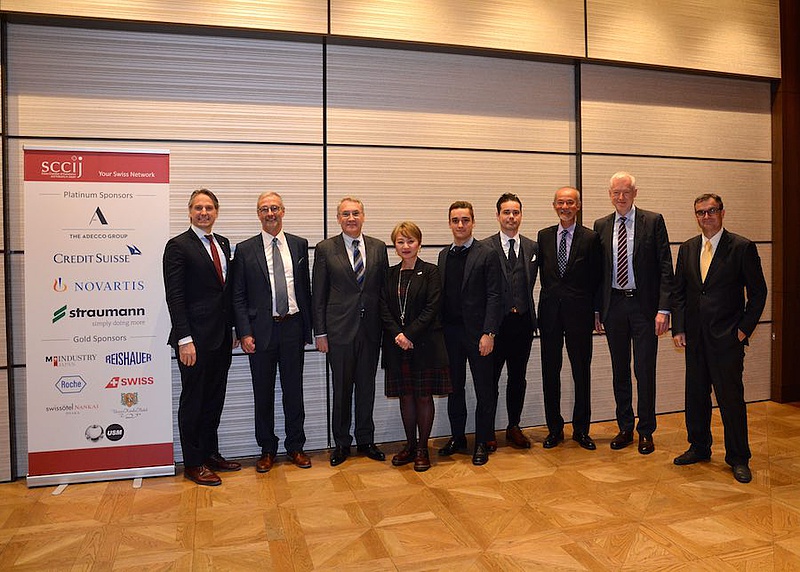Tokyo (SCCIJ) – At the November luncheon, more than 30 members and guests of the Swiss Chamber of Commerce and Industry in Japan were entertained by Mr. Daniel Küng, Chief Executive Officer of Switzerland Global Enterprise (S-GE), with success stories of Swiss small and medium-sized firms which conquered foreign markets by adaption and innovation. S-GE is the Swiss export and investment promotion agency on behalf of the Swiss Confederation. In Japan, it is represented by the Swiss Business Hub Japan. Mr. Küng outlined several lessons about their international growth between globalization and protectionism. Small and medium enterprises could compete on a global scale, with a little help by S-GE, he stated.
Miniature nut cakes
The luncheon speaker from Switzerland started his talk by drawing parallels between Switzerland and Japan. Both countries would be traditional producers and exporters of goods and have had big success with it. But this success impedes their ability to adapt to the new disruptive economic forces. One challenge would be digitalization of many business sectors which endangers the current lead of the two countries. “Therefore, we are both in the situation that we need to act soon,” the speaker said.

SCCIJ November Luncheon
To introduce his luncheon talk topic, Mr. Küng referred to a small bakery from the mountain city of Sedrun at the height of 1,400 meters in the Swiss Alps. In order to win new customers besides locals and tourists, master baker Reto Schmidt of “La Conditoria” came up with the idea to miniaturize the traditional Graubünden nut pastry to make it more marketable. “La Conditoria delivers the example of a company which had success by changing its business model”, the S-GE CEO emphasized.

SCCIJ November Luncheon speaker Mr. Daniel Küng, CEO of Switzerland Global Enterprise
“Smallest company can export”
The bakery started to produce the miniature pastries during the day when its ovens were not needed to make bread. S-GE helped the company to find customers in Germany, South Korea, and Dubai. “We also helped them get listed in the U.S. supermarket chain Fairways,” Mr. Küng added. Starting at a production of 3,000 mini-pastries per hour, the bakery is currently building a new factory to boost its capacity to 20,000 cakes per hour by next year.
“One learning from this success story could be that even the smallest companies have export prospects,” the speaker said. The basis for such exports have been created and laid by the Swiss government. So far, Switzerland has put 30 free trade agreements in place to make the conquering of foreign markets easier for small and medium-sized companies. For example, Switzerland is the only European country which has a free trade agreement with China, the speaker said.
“SMEs cannot afford not to go abroad”
Also, it would be important to position yourself in new markets, Mr. Küng stated. The global middle class as defined by the World Bank will double within 15 years to 2.5 billion people. Most of this growth will happen in Asia. Two third of global consumption would also happen in Asia. Swiss companies have recognized this changing pattern and adapted to it. Their export share to Europe has fallen because of a diversification to countries outside of Europe. 15 years ago, many SMEs in Switzerland had asked themselves whether they could afford to go abroad. “Now, the question is whether they can afford not to go,” the speaker said.
Another point he made was that globalization is alive. Despite the big discrepancies on how trade should ideally look like, international value chains are so entrenched that it will be extremely difficult to dismantle them, Mr. Küng argued. There would be less foreign investment due to the growing isolationist tendencies of the United States. At the same, this trend is also caused by digitalization which allows to bring back production from East to West. At the same time, consumption is moving from West to East. Non-tariff barriers would exist but could be overcome. “Swiss companies need to adapt their products to those new markets,” the speaker said.

SCCIJ Executive Committee members and advisors with Swiss Ambassador Jean-François Paroz and Luncheon speaker Daniel Küng
S-GE’s support of exporters
Mr. Küng named the Swiss strength in innovation as another supporting factor for Swiss SMEs in their expansion. He told the story of a Swiss mattress maker who put sensors in them in order to sell them to people suffering from osteoporosis and snoring. With the help of an expensive research and development department, this new business model proved successful due to new innovative product features. In addition, the right partners for exports needed to be found. For this, a short sales pitch to S-GE would suffice, he said with a smile. Over the last decade, the export promoter has helped about 10,000 Swiss companies into foreign markets.
“We are not a cultural bridging company and not teaching how to behave in foreign markets,” the CEO explained in the Q&A luncheon part. “But the Swiss export promoting agency would connect them with companies and experts having the necessary knowledge”, he stated. Potential exporters would often be very conscious about cultural barriers in far-away markets. “Hence, they usually use consultants to be best prepared,” he said. According to a S-GE study, more Swiss companies had failed in markets like Germany and France which they thought to be similar and where they did not prepare themselves enough.
Biography of the speaker
Mr. Daniel Küng has been heading Switzerland Global Enterprise (S-GE) since 2004. After graduating from University of St. Gallen, he started his professional career in Brazil. In 1982 he founded a consulting company for agribusiness in Latin America and co-headed it for six years as a managing partner. In 1988 Mr. Küng moved to Portugal where he founded and co-managed for 16 years the Response Group, a group of companies focusing on business and foreign direct investment consulting, contract servicing and end-of-life cycle management for the pharmaceutical industry. He and his partners sold the company in 2004. Mr. Küng was active in a number of different chambers of commerce and presided the Portuguese-Swiss Chamber of Commerce.
Text and photos: Martin Fritz for SCCIJ





























